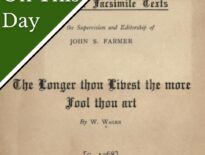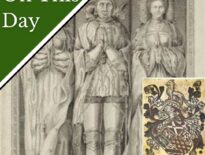On this day in Tudor history, 28th March 1555, Protestants Stephen Knight and William Pygot were burnt at the stake for heresy in Essex, at Maldon and Braintree, respectively.
In his Book of Martyrs, martyrologist John Foxe writes of how Stephen Knight and William Pygot were first examined regarding their views on the eucharist, to which they answered that the body and blood of Christ were only in heaven and nowhere else. After being examined regarding other beliefs, according to Foxe, they “were exhorted to recant and revoke their doctrine, and receive the faith” but refused, and when Bishop Bonner realised “that neither his fair flatterings, nor yet his cruel threatenings, would prevail”, he condemned them for heresy. They were handed over to the sheriffs of London and imprisoned at Newgate until they were taken to Essex for their executions.
Foxe records:
“The twenty-eighth day of March, the said William Pygot was burned at Braintree; and Stephen Knight at Maldon, who, at the stake, kneeling upon the ground, said this prayer which here followeth.
"O Lord Jesus Christ! for whose love I leave willingly this life, and desire rather the bitter death of thy cross, with the loss of all earthly things, than to abide the blasphemy of thy most holy name, or to obey men in breaking thy holy commandment: thou seest, O Lord, that whereas I might live in worldly wealth to worship a false god, and honour thine enemy, I choose rather the torment of the body and the loss of this my life, and have counted all things but vile, dust, and dung, that I might win thee; which death is dearer unto me, than thousands of gold and silver. Such love, O Lord, hast thou laid up in my breast, that I hunger for thee, as the deer that is wounded desireth the soil. Send thy holy Comforter, O Lord, to aid, comfort, and strengthen this weak piece of earth, which is empty of all strength of itself. Thou rememberest, O Lord, that I am but dust, and able to do nothing that is good: therefore, O Lord, as of thine accustomed goodness and love thou hast bidden me to this banquet, and accounted me worthy to drink of thine own cup amongst thine elect; even so give me strength, O Lord, against this thine element, which as to my sight it is most irksome and terrible, so to my mind it may, at thy commandment, (as an obedient servant,) be sweet and pleasant; that, through the strength of thy Holy Spirit, I may pass through the rage of this fire into thy bosom, according to thy promise, and for this mortal receive an immortal, and for this corruptible put on incorruption. Accept this burnt sacrifice and offering, O Lord, not for the sacrifice, but for thy dear Son's sake my Saviour, for whose testimony I offer this free-will offering with all my heart and with all my soul. O heavenly Father! forgive me my sins, as I forgive all the world. O sweet Son of God my Saviour! spread thy wings over me. O blessed and Holy Ghost! through whose merciful inspiration I am come hither, conduct me into everlasting life. Lord, into thy hands I commend my spirit! Amen."
On the very same day, Protestant William Dighel was burnt at the stake for heresy.
Of Dighel, Foxe simply records “About this time suffered William Dighel, most constantly offering his body a burnt-sacrifice unto God, forsaking the world, life, and all, for the love of his holy truth.”
Although, as Susan Doran and Thomas Freeman point out in “Mary Tudor: Old and New Perspectives”, in his 1563, Foxe states that Dighel was burnt in Banbury, Oxfordshire, in a previous edition he stated Danbury, in Essex, which is backed up by John Knox and the Crowley Chronicle. Wherever, he was burnt, he died for his Protestant faith.
Also on this day in Tudor history...



Leave a Reply